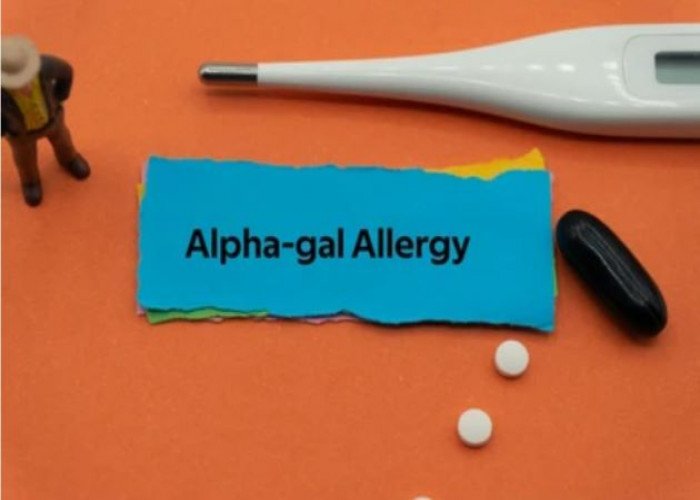 Welcome
Welcome
“May all be happy, may all be healed, may all be at peace and may no one ever suffer."
Alpha-gal syndrome

The alpha-gal syndrome is a type of food allergy that affects some people who have been bitten by certain species of ticks. The allergy is caused by the bite of the Lone Star tick, which is found in the southeastern and eastern United States.
The allergy is to a sugar called galactose-alpha-1,3-galactose (alpha-gal), which is found in many mammalian products, including beef, pork, and lamb. Symptoms of the alpha-gal syndrome can include hives, itching, swelling, and difficulty breathing, and can occur several hours after consuming red meat.
Diagnosis of the alpha-gal syndrome can be made through blood tests that measure the presence of antibodies to alpha-gal. Skin tests or oral food challenges may also be used to confirm the diagnosis.
Treatment for alpha-gal syndrome involves avoiding all products containing alpha-gal, including red meat, as well as products derived from these animals, such as gelatin and some medications. Some people may also benefit from medications to relieve symptoms, such as antihistamines or epinephrine.
If you think you may have the alpha-gal syndrome, it's important to see an allergist or immunologist for proper evaluation and treatment. They can help you develop a plan to manage your allergy and prevent potentially life-threatening reactions.
Research Papers
Disease Signs and Symptoms
- Hives
- Itching
- Dry scaly skin
- Swollen skin
- Shortness of breath (dyspnea)
- Runny nose
- Nausea or vomiting
Disease Causes
Alpha-gal syndrome
A Lone Star tick bite most commonly causes the condition in the U.S. Bites from other types of ticks can lead to the condition in the U.S., Europe, Australia and Asia.
Tick bites
Ticks that cause alpha-gal syndrome are believed to carry alpha-gal molecules from the blood of the animals they commonly bite, such as cows and sheep. When a carrier tick bites a human, the tick injects alpha-gal into the person's body.
For unknown reasons, some people have such a strong immune response to these molecules that they can no longer eat red meat or products made from mammals without a mild to severe allergic reaction. People who are exposed to many tick bites over time may develop more-severe symptoms.
Disease Prevents
Alpha-gal syndrome
The best way to prevent alpha-gal syndrome is to avoid areas where ticks live, especially wooded, bushy areas with long grass. You can decrease your risk of getting alpha-gal syndrome with some simple precautions:
- Cover up. When in wooded or grassy areas, wear shoes, long pants tucked into your socks, a long-sleeved shirt, a hat and gloves. Try to stick to trails and avoid walking through low bushes and long grass. Keep your dog on a leash.
- Use insect repellents. Apply insect repellent with a 20% or higher concentration of DEET to your skin. Parents should apply repellent to their children, avoiding their hands, eyes and mouths. Keep in mind that chemical repellents can be toxic, so follow directions carefully. Apply products with permethrin to clothing or buy pre-treated clothing.
- Do your best to tick-proof your yard. Clear brush and leaves where ticks live. Keep woodpiles in sunny areas.
- Check yourself, your children and your pets for ticks. Be especially vigilant after spending time in wooded or grassy areas.
- It's helpful to shower as soon as you come indoors. Ticks often remain on your skin for hours before attaching themselves. Showering and using a washcloth might remove unattached ticks.
- Remove a tick as soon as possible with tweezers. Gently grasp the tick near its head or mouth. Don't squeeze or crush the tick, but pull carefully and steadily. Once you've removed the entire tick, dispose of it and apply antiseptic to the bite area.
Disease Treatments
As with any food allergy, alpha-gal syndrome treatment involves avoiding the foods that cause your reaction. Always check the ingredient labels on store-bought foods to make sure they don't contain red meat or meat-based ingredients, such as beef, pork, lamb, organ meats or gelatins. Check soup stock cubes, gravy packages and flavor ingredients in prepackaged products. Ask your doctor or allergist for a list of foods to avoid, including meat extracts used in flavoring. The names of some ingredients make them difficult to recognize as meat based.
Use extra caution when you eat at restaurants and social gatherings. Many people don't understand the seriousness of an allergic food reaction, and few realize meat allergies even exist. Even a small amount of red meat can cause a severe reaction.
If you are at all worried that a food may contain something you're allergic to, don't try it. Come prepared to social events to avoid risk of exposure. For example, if you're attending a party where guests prepare food on a shared cooking surface, bring your own precooked food.
For a severe allergic reaction, you may need an emergency injection of epinephrine and a visit to the emergency room. Many people with allergies carry an epinephrine autoinjector (EpiPen, Auvi-Q, others). This device is a syringe and concealed needle that injects a single dose of medication when pressed against the thigh. Once you've been diagnosed with alpha-gal syndrome, your doctor or allergist likely will prescribe an epinephrine autoinjector.
Symptoms of alpha-gal syndrome may lessen or even disappear over time if you don't get any more bites from ticks that carry alpha-gal. Some people with this condition have been able to eat red meat and other mammal products again after one to two years without additional bites.
Disease Diagnoses
Disease Allopathic Generics
Disease Ayurvedic Generics
Disease Homeopathic Generics
Disease yoga
Alpha-gal syndrome and Learn More about Diseases

Skin cancer

Allergies

Sleep terrors (night terrors)

Autoimmune hepatitis

Hot flashes

Shellfish allergy

Chronic daily headaches

Cardiogenic shock
Alpha gal syndrome, Alpha gal allergy symptoms, আলফা গ্যাল সিনড্রোম
To be happy, beautiful, healthy, wealthy, hale and long-lived stay with DM3S.
